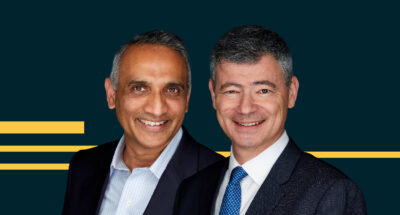Be humble as a leader
But he underscored the need to balance ambition with humility — a point echoed by Katharina Lange, Professor of Leadership at IMD. “Humility is one of the key leadership traits. We know that humble leaders are more effective than [narcissistic] ones,” she said, adding that they are also typically more open to learning.
Meanwhile, the pandemic has intensified the need for human connection. There are big implications for working practices. Referencing a recent HBR article on hybrid working, Lange said time in the office should be reserved for structured collaboration, collegial learning and “the human moment”. “We can’t really build connectedness and culture virtually, so the workplace becomes the place for relationship-building,” she said, adding this was important for generating the creative spark needed for innovation.
This will be important as companies look to embrace sustainability and transform their business models. One such institution is Philip Morris International (PMI), the international tobacco company that owns the Marlboro cigarette brand. Its vision is to create a smoke-free future and to stop selling cigarettes, reflecting the company’s commitment to its social responsibility.
In 2015, PMI created a completely new tobacco product category called Heat Not Burn, and launched IQOS, a less harmful alternative to continued smoking, which heats tobacco instead of burning it, and reduces exposure to harmful chemicals in users who completely switch.
“Today, we estimate there are over 19 million IQOS users in the world, of which over 70% have stopped cigarette smoking. Smoke-free products represent almost one quarter of our net revenues in 2020,” said Ilaria Gregotti, Global Head of People and Culture, Product Function. “We decided to self-disrupt and transform the company, and cannibalize our own combustible products.”
Hiring diversity to drive change
Gregotti said a critical factor in the transformation success was the re-balancing of long-held hiring practices. The company has traditionally promoted internal candidates to leadership roles — now internal talent is complemented by outside perspectives.
“We’ve gone on a massive recruitment spree — we’re talking several thousand people that we’ve brought in over the past six years, to really drive that deep level of capability, from electronics, to consumer insights to organizational effectiveness and global communications, to name just a few,” said Gregotti.
In doing this, the company had to devise strategies to ensure assimilation of newcomers. The measures included codifying and communicating the unique organizational culture at PMI, which is relationship-based and favors action over talk on business model transformation.
“[Also,] we buddy-up new joiners with people who’ve been in the organization for some time, who can guide them not just on understanding the organization, but also meeting people and helping them build those important internal networks,” Gregotti said.
The employees also had to shift to more project-based work across the organization. “The line managers need to change their behaviors and let go of resources to work on cross-functional activities,” she said, adding that, even though the company is still on its transformation journey and there is still a lot to do, the new strategy’s success makes the transformation well worth the effort.

Audio available





